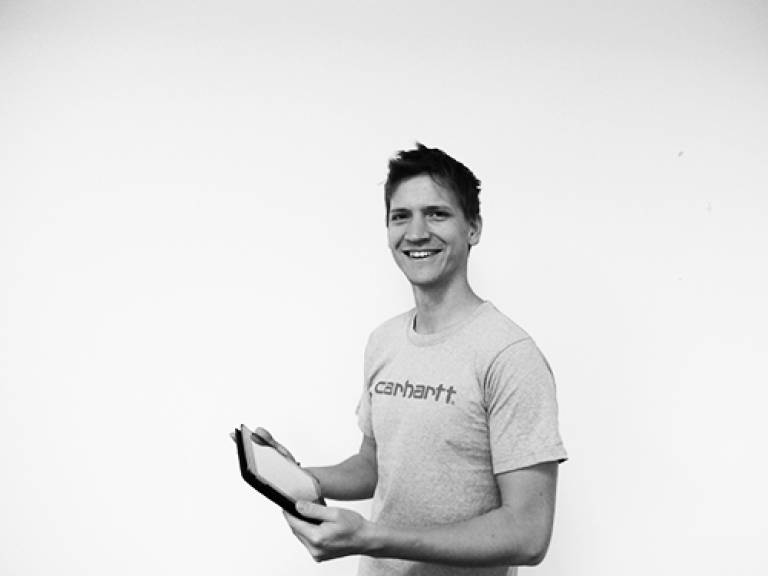10 tips and tricks for completing your UCL Arena application
5 June 2014

Senior Fellowship applicant Matt Jenner, E-Learning Environments, offers his advice for writing a UCL Arena Fellowship application
If you are you in the process of completing your UCL Arena application or thinking about getting involved, then bookmark this page – it will prove invaluable.
The UCL Arena scheme, which launched in April 2014, aims to give staff the chance to share ideas and gain recognition for their teaching in the form of Fellowships accredited by the Higher Education Academy (HEA). In order to gain a Fellowship, applicants are invited to complete a four-part form, which includes case studies and references.
Matt Jenner, E-Learning Environments, is among about 250 UCL people who have so far elected to take advantage of the opportunity. He offered to share his advice.
1 Don’t work in isolation
I’d recommend attending a UCL Arena initial guidance session and visiting the UCL Arena Moodle space. It gives you the chance to discuss your application with others and receive advice. There’s also value in doing this in a small group within department or faculty, this will provide you all with some local encouragement, examples to share between one another and hopefully a boost in morale as each of you get your fellowships.
2 Choose a Fellowship that you’re comfortable with
There are three levels of Fellowship available at UCL based on different levels of experience and attainment. Aim for the level you’re comfortable with. You can always apply for the next level later.
3 Pretend you’re applying for a job
In order to write your four 500-word case studies, it can help to pretend you’re looking to get promoted at UCL and need some things to boast about for a job application – what would you use as the best you’ve done in the past three-or-so years?
4 Do a CPD/professional development log early
It’s tempting to leave this to the end, but actually it can provide a framework to base case studies on. I went through my diary to remember what I’ve been doing, as it’s too easy to look forward, forgetting previous efforts too hastily.
5 Use the UKPSF
The criteria for successful applications are based on the HEA’s UK Professional Standards Framework (UKPSF). Have a look at the UKPSF (PDF) and try to get the areas well embedded in your head.
I took a screenshot and had it on my monitor to Alt+Tab into when I wasn’t quite sure of the words (or print it, if you’re an offline type). I then tried to reuse their words. This makes it easier for the assessor to agree with your claim.
My approach was to ensure three of my four case studies firmly mapped to one core area each. Then, the final case study covered any weak links.
6 Make the most of your 500 words
For each case study, gather evidence and use it to prove your claims. Try to avoid repetition – it’s a waste of words. And if you write anything that is not linked to the UKPSF, what’s the value?
7 Map case studies to the UKPSF
I made a table to ensure that, across my four case studies, I covered each relevant area of the UKPSF. Each time I demonstrated a section of the UKPSF in one of my case studies, I made a mark, so that by the time I was finished, I was confident I had met all the criteria. I found it so helpful that it felt like cheating. I also noticed I had multiple marks for some areas (like A3, A4 or V3), which might’ve been a little over-claiming or over-doing certain areas. I’d probably try to avoid this.
| Case study 1 | Case study 2 | Case study 3 | Case study 4 | |
| Areas of activity | / | / | ||
| A1 | / | / | ||
| A2 | / | / | ||
| A3 | / | / | // | |
| A4 | // | / | / | |
| A5 | / | / | / | |
| Core knowledge | ||||
| K1 | / | / | ||
| K2 | / | / | ||
| K3 | / | |||
| K4 | / | / | ||
| K5 | / | |||
| / | ||||
| Professional values | ||||
| V1 | / | |||
| V2 | / | |||
| V3 | / | /// | ||
| V4 | / |
Remember, though, if you are going for Associate Fellowship, you don’t have to map your application to all areas – read the guidance on this in Moodle.
8 Help your referees
Let them read drafts, ensure they have ‘guidance for referees’ documentation (available in Moodle) and give them WEEKS to return a reference. Even the most helpful and reliable referee will need time to ensure they contribute honestly and thoughtfully.
9 Don’t get hung up on submission deadlines
Try not to worry about missing one, as the next one will come quicker than you may imagine. Plus, if you submit but don’t receive the Fellowship you applied for, you don’t fail. Take the feedback, refine your application and submit again.
10 Enjoy it
I found it a tricky exercise to remember the stuff I’ve done. However, it’s important to look back, and I don’t think we do it enough.
 Close
Close

